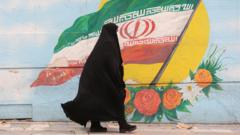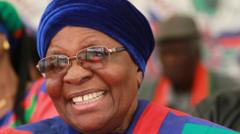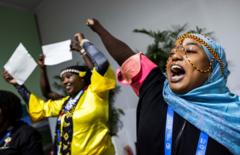The recent WTA Finals held in Riyadh exemplify Saudi Arabia's strategic investment in women's sports as part of its effort to reshape its international image. Hosted in a country known for its conservative stance on women's rights, the event highlights the contrasting narratives of progress and repression that define the kingdom's current sociopolitical landscape.
Saudi Arabia Hosts WTA Finals: A Strategic Move in Sports and Gender Dynamics

Saudi Arabia Hosts WTA Finals: A Strategic Move in Sports and Gender Dynamics
The Women's Tennis Association Finals in Riyadh marks Saudi Arabia's growing influence in global sports amidst ongoing debates about women's rights and human rights practices.
The atmosphere in Riyadh's stadium was electric as the Women’s Tennis Association (WTA) Finals kicked off amidst a magnificently choreographed event filled with vibrant purple lighting and pulsating music. The kingdom's push into the global sports arena is evidenced not only through soccer, golf, and boxing but also via its latest venture into women's tennis, as showcased by the thrilling final featuring Coco Gauff from the United States and China's Zheng Qinwen.
An announcer’s call to "Change the game" resonated deeply on this landmark night, symbolizing a transformative moment in a nation often criticized for its slow progress on women’s rights. The fact that many in attendance were Saudi women, celebrating a momentous occasion, painted a powerful image of a shifting paradigm regarding gender representation in sports.
Crown Prince Mohammed bin Salman has spearheaded this transformation, utilizing Saudi Arabia's wealth from oil to foster a sporting culture that aligns with his ambitious vision for the kingdom. The country's embrace of professional sports is ambitious: a recent injection of $2 billion into golf, high-profile acquisitions in soccer including Newcastle United, and a successful bid for the 2034 World Cup showcase an aggressive expansion strategy.
Yet, these developments bring forth a complex picture. Critics argue that the substantial investment in global sports serves to "sportswash" the kingdom's historical human rights violations and ongoing restrictions on civil liberties. In juxtaposition, proponents of the recent changes contend that these reforms may pave the way for broader acceptance and empowerment of women in the region.
As Saudi Arabia continues its quest for prominence in the world of sports, the WTA Finals could be seen not just as a celebration of athletic prowess but also as a litmus test for cultural evolution and gender equality in the Arabian Peninsula. The dialogue around this pivotal event will likely continue to reflect broader conversations about the intersectionality of sport, culture, and human rights in an ever-changing world.






















